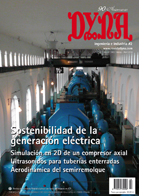CONTRIBUTION OF A PUMPED STORAGE HYDROPOWER PLANT WITH VARIABLE SPEED IN PUMPING MODE TO THE LOAD-FREQUENCY REGULATION OF AN ISOLATED POWER SYSTEM
Keywords:
Central reversible, velocidad variable, control frecuencia-potencia, límite de estabilidad hidráulico, tubería forzada larga, modelo de simulación, Pumped storage power plant, variable speed, load-frequency control, hydraulic stability limit, long penstock, simulation modelAbstract
The development of renewable energies is growing in recent years, promoted by many governments in response to climate change. The main drawbacks of renewable energies, come from uncertainty and variability in the short term of wind and solar radiation. For many years, pumped storage power plants have become one of the most important means to cover the lack of regulation, characteristic of aforementioned renewable energies. In addition, pumped storage power plants can nowadays be operated with variable speed, thanks to last decades improvements in electronic frequency converters. Converters are usually limited by electrical magnitudes (voltages or currents) but in some cases hydraulic limits can be more restrictive, as in high head power plants. The main objective of this work is to study the influence of a pumped storage power plant with variable speed on an isolated system, and to analyze how the hydraulic limits of the reversible turbine in pumping mode reduces the power plant regulation capacity. For this purpose, a dynamic model of the power plant and the isolated system has been developed by means of Matlab/Simulink. Some simulations are carried out and it is indeed stated that hydraulic characteristics constrain the possibility of the pumped storage power plant, to offer load-frequency regulation in the secondary market. Keywords: Pumped storage power plant, variable speed, load-frequency control, hydraulic stability limit, long penstock, simulation modelDownloads
Published
2016-03-01
Issue
Section
ARTICULOS

